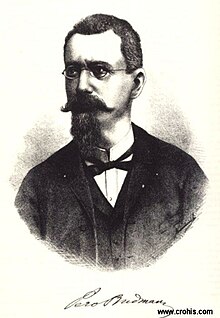fiction.wikisort.org - Writer
Petar "Pero" Budmani (Serbian Cyrillic: Перо Будмани; 27 October 1835 – 27 December 1914) was a writer, linguist, grammarian, and philologist from Dubrovnik and a renowned polyglot.
Biography
Budmani was born in Dubrovnik/Ragusa on October 27, 1835. He was a member of the Serb-Catholic movement in Dubrovnik.[1][2][3][4]
Budmani was one of the first persons to have used the combined term Croatian and Serbian into "Serbo-Croat (Illyrian)".[5] It was first used by the German Jacob Grimm in 1824 and the Austrian-Slovenian Slavist Jernej Kopitar in 1836.[6] He wrote a seminal book in Italian called Grammatica della lingua serbo-croata (illyrica) that described the Serbo-Croatian grammar, published in Vienna in 1867. Because it was written primarily as a manual for use in the gymnasia in Dalmatia, it was restricted in scope and space, but it soon received high praise from Đuro Daničić in Rad JAZU #2 in 1868. Budmani's description of the limited use of aorist and imperfect and the subtleties of perfect was consistent with Croatian vernacular at the time.[7]
He taught in the Gymnasium (high school) of his hometown and then from 1883 to 1907 he was editor of the Riječnik (Dictionary) of the Yugoslav Academy of Sciences and Arts, based in Zagreb, Croatia, then part of Austria-Hungary.[8] He was also a corresponding member of both the Serbian Learned Society and the Serbian Royal Academy as well as the Russian Academy of Sciences.[8][9]
Pero Budmani was one of the prominent members of the Serb Catholic movement in Dubrovnik. He was a member the Municipal Council of Dubrovnik. Budmani was among those who oversaw the construction of a monument dedicated to Ivan Gundulić.[citation needed] The unveiling of the Gundulić monument in Dubrovnik took place on May 20, 1893.
In 1907 he returned to Italy to Castelferretti and lived there until 1913 years when he returned to his native Dubrovnik. But already the following year, seriously ill and embittered for the persecution suffered at the hands of the Austrian police (who considered him a dangerous subversive), Pero Budmani fled from home, reached Ancona and died there on December 27, 1914.
Budmani spoke most of the European languages, including Old Slavonic, Greek, Latin, and several Asiatic languages.
Robert D Greenberg, Associate Professor Department of Slavic Languages and Literatures, describes him as a Croat linguist.[10]
Selected works
References
- Nikola Tolja, Dubrovacki Srbi katolici - istine i zablude, Dubrovnik 2012
- "THE CULTURE OF CATHOLIC SERBS FROM DUBROVNIK IN CONTEMPORARY CROATIAN HISTORIOGRAPHY - PDF". docplayer.net. Retrieved 2019-06-26.
- Ligorio, Orsat. "Перо Будмани : Поводом стогодишњнице смрти (Хендаут)".
{{cite journal}}: Cite journal requires|journal=(help) - Trnavac Ćaldović, Nataša (2018). Fashioning of the literary national identity: literary work of Ivan Stojanović from Dubrovnik. Niš: University of Niš.
- Alexander, Ronelle (2006-08-15). Bosnian, Croatian, Serbian, a Grammar: With Sociolinguistic Commentary. ISBN 9780299211936.
- Okuka, M. 1998. Eine Sprache - viele Erben. Sprachpolitik als Nationalisierungsinstrument in Ex-Jugoslawien. Klagenfurt: Wieser Verlag, S. 16.
- Peti, Mirko (June 1985). "Pogledi jugoslavenskih lingvista na sintaksu vremena". Rasprave Instituta Za Hrvatski Jezik I Jezikoslovlje (in Croatian). Institute of Croatian Language and Linguistics. 10–11 (1): 110–111. ISSN 1331-6745. Retrieved 2012-03-27.
- "Predsjednici Hrvatske akademije znanosti i umjetnosti od osnutka Akademije do danas" (PDF). Glasnik HAZU. 5 (8–9): 11. 2018.
- Ćelić, Stojan (1987). Srpska akademija nauka i umetnosti, 1886-1986. Srpska akademija nauka i umetnosti. p. 168.
- Greenberg, Robert D. (2004). Housing the Stranger in the Mediterranean World: Lodging, Trade, and Travel. Oxford. p. 113.
На других языках
- [en] Pero Budmani
[ru] Будмани, Перо
Перо Будмани (1835—1914) — сербский филолог.Другой контент может иметь иную лицензию. Перед использованием материалов сайта WikiSort.org внимательно изучите правила лицензирования конкретных элементов наполнения сайта.
WikiSort.org - проект по пересортировке и дополнению контента Википедии
